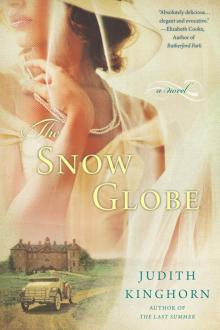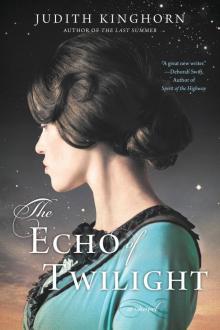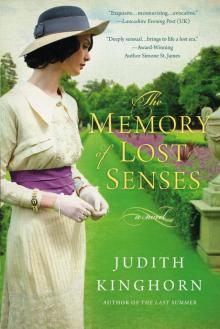- Home
- Judith Kinghorn
The Echo of Twilight Page 12
The Echo of Twilight Read online
Page 12
I shook my head. “He won’t.”
“How can you be so sure?”
“Because he’s a good person.”
Then, turning to me, she said, “Oh, Pearl . . . I know he’s a good person.” And I saw a new sympathy in her eyes, and I had a strange fluttering in my stomach: a feeling you get when you know something’s coming. “He hasn’t told you, has he?”
“I’m not sure,” I said, hoping yet knowing and waiting for it to come.
The room tensed itself. My throat felt as tight as a coil about to spring.
“He’s married, Pearl.”
Married. The word bounced about the room, reverberating off the blue-painted walls and china figurines. And with its reverberation came that gushing sound, flooding my ears and head like a great wave. And though Ottoline went on speaking, though I could see her mouth moving, her voice drifted away; and down and down I sank, until all I could hear was the distant drum of my own heartbeat.
Then loud and clear came Kitty: Stand up straight and look at Her Ladyship when she’s speaking to you. And thus, I surfaced.
“. . . So it’s a learning curve,” Ottoline was saying. She moved over the room to the sofa, sighed as she sat down. “Men do tend to miss out the small detail of a wife when they want something . . . someone,” she said, raising her eyes and glancing over at me. “Of course, it’s not a conventional marriage—never was. She’s older than he is, French . . . Her name is Marie Therese.”
She beckoned me over to where she sat. And so I went, and I sat down, next to her. She took hold of my hand, gripped it tightly in hers. Her rings pressed into my fingers. “They married some eight years ago, when Raffy was on his first trip to the Continent. French, Roman Catholic—she wouldn’t allow him to touch her without a ring on her finger. Silly boy . . . But perhaps he wanted a mother figure. Anyhow, initially, it seemed they were happy-ish. They moved about . . . France, Spain, Italy. Came to England once or twice . . . and then, well, his letters and postcards were signed off just from him. From Ralph.”
Finally, I thought of a word to say: “Divorced?”
Ottoline gasped. “Divorced? My dear, Marie Therese Stedman is French, a Catholic . . . She’ll never countenance divorce. No, she and Ralph have to live with their mistake. They will never divorce. Ralph will never be able to remarry—no matter how much he loves someone,” she added, looking me in the eye.
“Children?” I said, after a moment or two.
“Thankfully not.”
I lowered my gaze to our hands, Ottoline’s fingers intertwined with my own. “I’ve embarrassed you and made a fool of myself. If you’d like me to leave—”
“Stop! You haven’t embarrassed me. Not at all . . . And I don’t believe you’ve made a fool of yourself, at least I hope not,” she said, scrutinizing me.
I said nothing. I knew I had made a fool of myself.
“I know only too well that we can’t choose whom we fall in love with,” Ottoline began again, “or when and how it will happen. We can only make decisions based on what we know, the facts of the matter, and the facts of the matter are Ralph’s situation. He’s married, taken.” She squeezed my hand. “And as for leaving, well, where would you go, hmm? Your home is here, now—here and in Northumberland. Your home is with me, Pearl.”
We sat in silence for some time, staring out at the still and sunlit gardens beyond the French doors. And she kept hold of my hand, and it didn’t feel remotely strange; it felt steadying, comforting and maternal. And I thought, This is what a mother would do. This is how a mother would be.
We were still sitting side by side and holding hands when Mr. Watts came in to ask Ottoline about dinner. She hadn’t eaten in the dining room since the day Felix Cowper left, and this evening once again she asked for a tray in her room, “In a little while, Watts, if you don’t mind . . . Around eight o’clock will be fine.”
I knew Mr. Watts didn’t like arounds, and abouts, and little whiles. He was a man of punctuality and precision. Vagueness was not his style, and I could see his discomfiture give way to mild alarm when he glanced to our hands and said, “Very well, Your Ladyship.” And, of course, trays to Ottoline were my job, not his.
As the door closed, I said, “Thank you for your kindness, my lady.” And I was about to go on, was about to explain to her that I would go to the kitchen and arrange her supper tray, attend her in the usual way, when she said, “Kindness? My motto in life has always been Do unto others as you would have them do unto you. I’m not sure that necessarily qualifies as kindness.”
“Oh, but it does, I think, and it’s what my aunt used to say . . . and You reap what you sow,” I added, and then wondered why.
Ottoline smiled, and as she finally let go of my hand, she said, “And what’s that other one? Let not the sun go down on your wrath? I don’t need you tonight, and I rather think you should go to him—to Ralph. You need to have your say. And I want you to. It’s important for you to express what’s in your heart, to release it. Otherwise it will fester there, and that’s not good. Not good at all.” She rose to her feet and I quickly rose, too; then I waited as she walked over to the window.
“Life’s so short, Pearl, so very precious and short,” she said, newly quiet. “I look out on these lawns, and it seems only a moment ago I ran across them and into my grandfather’s arms; only a moment ago that I watched Hugo and Billy playing on them.” She turned to me. “That’s all we have, you see, in the end: a handful of moments . . . and that’s why we must seize and hold on to each one of them,” she added, clenching a fist out in front of her. “Otherwise . . . well, they simply slip away.”
As I opened the door for her, she smiled and placed her hand on my arm. She said, “Do whatever you have to do. Say what you have to say. But please come back to me. I need you.”
I watched her cross over the hallway, watched her climb the stairs, and I thought, I’ll come back to you. I’ll come back to you and I’ll never leave you. Never.
And then I walked out into the golden light of an August evening.
Chapter Eleven
It was a golden evening in August when Henry Gibson sat down in the mud on the banks of the Thames. He wept beneath a bruised heaven. For the sky over London was like one of Mr. Turner’s paintings, Kitty said, all purple and mauve and yellow. And it had taken my mother’s body six days to float upstream to Mortlake. Six days since Henry had found the baby wrapped up in a blanket at the back of his workshop. Six days since he’d carried the small bundle in to his sister.
They had both remarked on the luminescence of the baby’s skin: “Like a pearl,” said Kitty, “a precious little pearl.”
And thus, I became.
The door stood open. He lay on the daybed beneath the window on the other side of the room.
“Good evening, Mr. Stedman.”
He looked up and smiled, put down his pencil and paper. “Ah, so we’re back to formalities, are we, Miss Gibson? You know, when you said you might be a while, I didn’t realize you meant almost a week.”
“And when you told me about your family, I didn’t realize you had a wife.”
He sat up, swung his legs off the bed. “Ah yes, my wife,” he said, staring down at the paint-splattered floorboards. “My wife,” he said again, running brown fingers through yellow hair. “Dear Marie Therese, whom I haven’t set eyes on in over a year, whom I married in haste.” He paused, glanced up at me. “Young and foolish haste.”
I shook my head. “It doesn’t matter how young you were or how foolish. You’re married, Ralph . . . and you didn’t tell me. You danced with me, you—you took off my shoes and held my hand. You held my hand here, and you told me nothing . . . nothing.”
That gushing sound was back inside my head. And I wanted him to get up, to walk over to me and take me in his arms, to hold me and tell me . . . tell me something that would make it stop. T
ell me something that would make sense of everything. But he didn’t. He stared up at me through that long yellow hair of his, and in that fine deep voice he said, “I’m sorry. I was going to tell you, Pearl. I intended to tell you.”
“Oh really? And would that have been before or after you’d seduced the lady’s maid?”
He shook his head. “It’s not like that and you know it. And if you hadn’t run off that night in search of Billy . . .”
I heard him call after me as I ran back along the path. Heard him as I leaped over the little stream. And then I stopped, and I waited. Why, I’m not sure.
No, that’s not true. I stopped because I knew time was slipping. I stopped because I had never known anyone like him—and knew I never would again.
And the air was thick and syrupy, and my head was still gushing, gushing with the sound of water, and I thought of my mother—drowning with her desperate love, drowning as she bled. And of Kitty’s smudged cross and unrequited love, and of Billy’s pure heart, and Ottoline’s unhappy marriage and sense of duty. Duty. Duty, honor, service and sacrifice, peace and goodwill . . . Peace and goodwill to all men and all women, and those boys, those boys sinking into the mud of another country.
And the scream that came out of me echoed all around the valley. And in the silence that came after, my body trembled and shook.
Then all was still, perfectly still and perfectly quiet. And an indeterminable time passed as we stood staring at each other. He held my gaze as he stepped over the stream. One of us said, Don’t go. One of us said, Stay. One of us reached out. And I was rescued. Anchored in his arms, steady once more.
When he lifted my face from his chest, he said, “I was going to tell you,” and I nodded; I knew. And as he continued to hold me, I continued to listen. “Despite your cynicism, I’m not in the habit of seduction—of ladies, maids, or lady’s maids. In fact, I’ve led a celibate life for the last few years, preferring to concentrate on my painting. Not that it appears to have done me much good. I’ve lived a nomadic existence. I have nothing to offer anyone—any woman, and, as you now know, certainly not marriage.” He paused, and I felt the warmth of his breath, his mouth on my hair. “The last thing you need is someone like me, a penniless painter, a less-than-mediocre imitator of masters. The last thing you need is a Ralph Stedman.” His arms tightened. “It was never my intention to hurt you, Pearl. I would rather die than hurt you.”
The road to hell is paved with good intentions . . .
It was not my intention to fall in love with a married man. I knew only too well the heartbreaking ramifications of such a liaison. I had not intended to be like my mother. Not for me the tawdry title of mistress. I intended to have a life bound in respectability, for better or worse, for richer or poorer. I wanted in sickness and in health; I wanted till death us do part. I wanted the white gown and confetti. And, accordingly, I had planned and thought through to the last detail how my own life would be—the hardworking devoted husband, the three well-mannered children, the clean and tidy house. A happy home.
But history has a habit of repeating itself—no matter how much we wish otherwise—and that evening, that quiet, sun-drenched evening in Scotland, I abandoned every plan and aspiration, and I intentionally and wholeheartedly entered into an illicit love affair. I made the decision consciously, knowingly, acutely aware of that moment, and the future.
Hand in hand we walked back to the cottage, crossed its threshold, closed the door. The lowering sun played in slants through the small window, casting stripes onto the splattered floorboards and paneled walls. And amidst the dust and painterly debris of brush-filled jars, unfinished canvases and strewn rags, I allowed Ralph to undress me.
Slowly and in silence he unbuttoned my blouse, draped it and then my skirt over the back of a chair. Slowly and in silence he unfastened my shoes, lifted my feet out from them and unrolled my stockings. He stared into my eyes as he loosened my bun, and so close, so close—studying my features as though they were of incalculable value, barely touching, breathing me in, he moved his mouth over my hair, my shoulders, my neck, until I could bear it no longer. And with our lips sealed, our bodies locked in a dance as old as time, we moved across the room—certain, knowing and sure of our fall. Then came a tangle—of breath and hands, of limbs and warm flesh; and wave after wave of new sensation, and a sudden burning pain.
Afterward, as we lay in each other’s arms, and perhaps seeing my tears, he asked, “Did I hurt you?”
But I couldn’t speak. This is the beginning, I thought. And I closed my eyes and smiled as a single finger crossed over my brow, down my nose to my lips.
“Do you know how long I’ve been waiting for you?” he said. “Not days . . . and not weeks. Years.”
I lifted his hand and pressed my lips to his palm. “I’m here now.”
He sighed. “I wish you’d been here earlier. Ten years earlier.”
“I was fourteen, Ralph. Still with Kitty, and I don’t suppose she’d have been too happy for me to run off with a painter . . . a reprobate,” I added, smiling as I used his word. But I didn’t want to think about that time, and I didn’t want to think about Kitty. I wanted to think only about us, and because we could not speak of any future, I went back to the beginning and I said, “Ralph, you know the day we first met, that day at the station in London?”
“Mm . . .”
I glanced to him, his head on the pillow next to me, his eyes half closed. “Did you see me in the refreshment room? Was that when you noticed me?”
He pulled his arm from under my head, reached over me to his packet of cigarettes, struck a match and lit one.
“Well?” I said as he lay back down beside me. “Did you?”
“I’m not sure I should tell you.”
“Oh, please . . . Please tell.”
He sucked on his cigarette, exhaled. “I sort of followed you there,” he said, staring up at the cobwebbed ceiling. “Of course, I was also heading to King’s Cross—so that was fortuitous—but it was on the Underground that I first saw you.”
“The Underground,” I mused. “But I never saw you . . .”
“An interesting face, I thought . . . A little too symmetrical, perhaps, but interesting all the same. A face with a story. Eyes like a wary young fox, and mouth quite set, determined.”
“You barely looked at me in the refreshment room.”
He slid me a glance. “I know how to do these things,” he said. “And anyway, I didn’t want you to see that I was drawing you. You might have slapped me.”
“Drawing me?”
“Mm, it’s somewhere here.”
“Can I see it?”
“You can when it’s finished. It’s still quite rough, but I think I caught the essence of you.” He went on. “Of course, it was more than a little strange when you introduced yourself to me as my cousin.” He smiled. “But that’s when I guessed who you were.”
“You knew?”
“There was a letter waiting for me when I arrived at the Hotel du Palais at Biarritz. It’s a place my family has visited—and one of Ottoline’s favorites. I’d told her I’d be spending a few nights there en route home. Her letter to me was mainly about arrangements for Scotland, but she also mentioned that she’d finally found a new maid. Rather quirky and a bit of a gamble, she said.”
I was a little rankled by that. And perhaps he sensed this, because he quickly added, “She also said she knew I’d like you.”
I smiled.
“It wasn’t exactly hard to figure out. You used Ottoline’s name and you were heading to Northumberland. And let’s face it, my darling, that suitcase of yours was far too large and heavy to be visiting any aunt for a few days.”
“That was Kitty,” I said, as though that particular lie had been her fault.
“I rather admired your ingenuity and wit. Clever creature, I thought. Why not be som
eone else on a journey? And you inspired me . . . I later introduced myself to someone as Hector Campbell, and enjoyed a very pleasant trip imagining a rendezvous with my own Ottoline.”
He reached over me, stubbed out his cigarette, and, still working it all through my mind, I said, “You knew . . . You knew and you played with me. All those lines about having met before. You knew you’d be seeing me again. You knew and I didn’t.”
“That’s how life works sometimes. But think of it this way—you made an impoverished painter very happy on that long journey north. I had something to look forward to. And I didn’t even know about the dancing. That was a wonderful surprise.”
And he stared at my mouth as I pulled him to me.
Chapter Twelve
The Germans seized Brussels; Namur fell; and then came news of the Battle of Mons. British casualties were estimated to be two thousand, and I thought, Two thousand? In one day? It seemed impossible, and I said so. I told Mr. Watts that I thought the newspapers had got it wrong; maybe it was two hundred, I suggested, and even that sounded two hundred too many. But no, Mr. Watts said, the newspaper’s figure would be correct, and the final toll significantly more.
August ended and September began. We read British losses were estimated to be in the region of fifteen thousand, that more nurses were needed, and more horses, and more men—always more men. We read that the French government had moved to Bordeaux, that Indian troops had arrived, and then, that the Allies were forcing Germany back; the enemy was in retreat. Mr. Watts poured us a glass of sherry and we toasted, “To victory!” He reckoned it would all be over by Christmas.
And still Ottoline said nothing about returning south. Mr. Watts asked me if I knew anything, and I said no. Then Mrs. Lister asked me, and I said no. Their questions rankled me, reminding me as they did that, sooner or later, there would and had to be change. But I had no desire to head south, no desire to be anywhere other than close to Ralph. Despite all our prayers and hopes, despite my determination to be optimistic, I knew that beyond the hills, beyond the quiet wilderness surrounding us, the tentacles of war were spreading and moments had to be seized. He who hesitates is lost. I would not be lost.

 The Snow Globe
The Snow Globe The Echo of Twilight
The Echo of Twilight The Last Summer
The Last Summer The Memory of Lost Senses
The Memory of Lost Senses